Features
The need to include all in country’s recovery
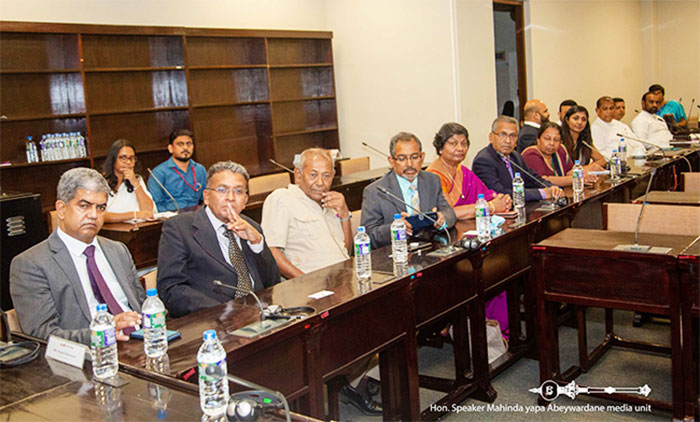
By Jehan Perera
The government’s greatest success has been to make the two most serious problems facing the country invisible and perhaps irrelevant to those at the top of the economic pyramid, including the international community. The government is able to show statistics that the economy has begun to recover. Growth in the last quarter is positive at 1.6 percent. It is anticipated that this growth will continue into the future. However, there is another set of statistics that tell the story that poverty levels have doubled to 25 percent, a quarter of the population, over this period. The signs of growth are visible in the Christmas décor that the Director of Customs has said is the highest expenditure on imports at present after the embargo on them was lifted. The suffering of hungry and malnourished people remains invisible.
The other major problem, the ethnic conflict, which gave rise to three decades of war has receded into the background not seen but bubbling underneath. It is not seen by either the government or the majority of people as a burning problem that requires urgent attention. It seemed to be so when President Ranil Wickremesinghe pledged to solve the ethnic conflict by Independence Day, February 4, in honour of Sri Lanka’s 75th independence anniversary. He is not the first to have made this type of promise. There were promises before too, when the war had ended and the international community was putting pressure for a quick political solution. They threatened sanctions such as taking away the EU’s GSP Plus tax concession, which they did take away for three years to the cost of Sri Lanka’s economy.
The government appears to have a plan to deal with the international community on issues of accountability and to the prolonged failure to reach a political solution to the ethnic conflict. On the one hand, it is going ahead with a plan to establish a truth and reconciliation commission by the time the next UN session on human rights is held in March. The government has already set up an interim secretariat for the TRC which is engaged in preparatory work for the commission. On the other hand, the government is also giving an indication that it is keen on solving the ethnic conflict through a political solution. The Himalaya declaration by a section of the Tamil Diaspora and some Buddhist monks may provide a broad framework for such a solution. In the past the Tamil Diaspora and Buddhist clergy have been seen as the ‘spoilers’ on either side of the issue. However, any attempt at a meeting of minds needs to be seen as a possibility or a potential solution and may be considered on its own merits.
INTERNATIONAL SUPPORT
According to media reports the United States has declared its support for the ongoing Global Tamil Forum (GTF) initiative to pursue a fresh dialogue with the government and other political parties meant to reach a post-war consensus on a lasting reconciliation. After having met the GTF delegation, led by its UK-based spokesperson Suren Surendiran and representatives of the Sangha for a Better Sri Lanka at the American Embassy on Dec 12, US Ambassador Julie Chung said that the US welcomed their initiative to expand cross-community understanding and seek lasting reconciliation. The problem is that even this initiative is seen as a ploy by the Tamil people and Diaspora who feel they have been left out of the equation.
Come September 2024, when the UN Human Rights Council will decide on whether or not to continue with the resolution on Sri Lanka. The government will be in a strong position to overcome the sanctions so far put on it by the UN system. The ongoing wars in Russia-Ukraine and Israel-Palestine and the horrendous human rights violations taking place there may be cited by the government as reasons for de-emphasising their attention on Sri Lanka. South Africa has been virtually alone in pressing charges against Israel in the International Criminal Court for war crimes. The world order based on the protection of civilians regardless of the provocation needs to be rebuilt.
However, in the north and east apart from the same economic hardships the people face the double burden of being treated unequally, which is the equivalent of being discriminated against. Despite the Tamil language being elevated to an official language in 1987, the people in the Tamil-majority north and east continue to get letters from the government in Sinhala. When they go to the police station, they have to deal with their statements being recorded in Sinhala by the Sinhala police officers which they do not understand. The numbers of senior officers in the north and east who are not familiar with the Tamil language is according to people living there on the increase which does not help to reduce tensions or gain confidence regarding the government’s commitment to equality to the Tamil speaking people. The situation is a replay a hundred years later of the plight of the Sinhala villager in Leonard Woolf’s classic novel “Village in the Jungle” who had British justice meted out to him in the English language he did not understand. There are numerous other examples that can be given.
CHANGE WANTED
The problem for the government is that despite the optics of normalcy the ground realities for people are harsh. Although prices have risen three-fold in the course of the past year, incomes of most people have not increased at all and many have not been able to even hold their jobs. A new UNDP report says top 1 percent of Sri Lankans own 31 percent of the total personal wealth in the country while bottom 50 percent only own less than 4 percent. It also says 33.4 percent of the populace grappling with vulnerability and deprivation concerning debt-related metrics. For households seeking funds for consumption, the primary sources of debt include pawning (31.1 percent), money lenders (24 percent), and banks (23.5 percent). These hardships would be conveyed to the children whose educational facilities are being cut, and who are hungry for food at night and would contribute to an increase of militancy in their minds against the government that is not looking after their interests.
So far the government has been successful in continuing to rule the country in much the same way with the same set of ministers who were driven out of office by the Aragalaya protest movement. It is worth noting that the UN in its latest Human Development Report for 2024 listed Sri Lanka as one of the three nations that stood out in Asia and the Pacific in showing agility in governance. SL is listed alongside India and Philippines in demonstrating speed and efficiency in responding to new information, unexpected events. The report pointed out Sri Lanka created an enabling environment for different actors to come together and lobby for change and said that collective action helped uphold democratic values and enabled a peaceful transition to a new government.
The government is skillful in projecting an image that any change of government could lead to a reversal of the economic gains. Both the main opposition party leaders have said that they will renegotiate the IMF agreement. This is not necessarily a departure from agreement with the IMF. Opposition Leader Sajith Premadasa said they would reach an agreement with the IMF so as not to burden the people. In particular, the government has been skillful in dividing the economic classes and getting the support of the upper and middle classes by catering to their fear of change and desire to retain the good life. It has also been adept at using the security forces to prevent protests on the streets against harsh economic measures being taken that the opposition cannot block in parliament. But the reality on the ground is that the people in the country want a change. They too want a piece of the cake and not words alone like the infamous Marie Antoinette of French Revolution ill-fame offered.
Features
Meet the women protecting India’s snow leopards
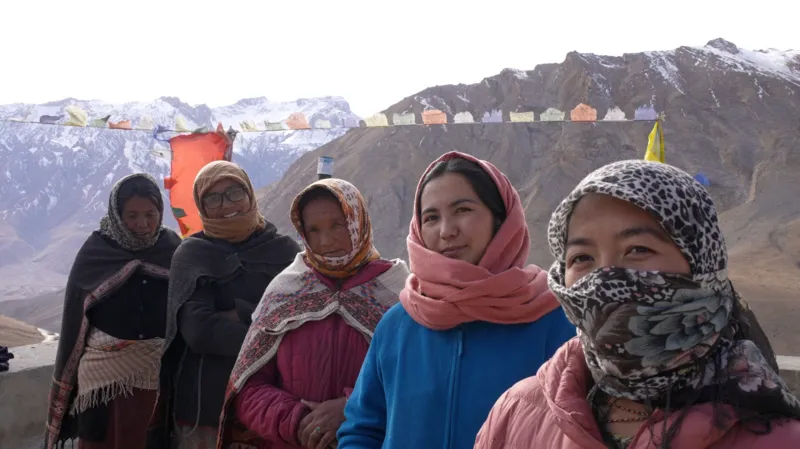
In one of India’s coldest and most remote regions, a group of women have taken on an unlikely role: protecting one of Asia’s most elusive predators, the snow leopard.
Snow leopards are found in just 12 countries across Central and South Asia. India is home to one of the world’s largest populations, with a nationwide survey in 2023 – the first comprehensive count ever carried out in the country – estimating more than 700 animals, .
One of the places they roam is around Kibber village in Himachal Pradesh state’s Spiti Valley, a stark, high-altitude cold desert along the Himalayan belt. Here, snow leopards are often called the “ghosts of the mountains”, slipping silently across rocky slopes and rarely revealing themselves.
For generations, the animals were seen largely as a threat, for attacking livestock. But attitudes in Kibber and neighbouring villages are beginning to shift, as people increasingly recognise the snow leopard’s role as a top predator in the food chain and its importance in maintaining the region’s fragile mountain ecosystem.
Nearly a dozen local women are now working alongside the Himachal Pradesh forest department and conservationists to track and protect the species, playing a growing role in conservation efforts.
Locally, the snow leopard is known as Shen and the women call their group “Shenmo”. Trained to install and monitor camera traps, they handle devices fitted with unique IDs and memory cards that automatically photograph snow leopards as they pass.
“Earlier, men used to go and install the cameras and we kept wondering why couldn’t we do it too,” says Lobzang Yangchen, a local coordinator working with a small group supported by the non-profit Nature Conservation Foundation (NCF) in collaboration with the forest department.
Yangchen was among the women who helped collect data for Himachal Pradesh’s snow leopard survey in 2024, which found that the state was home to 83 snow leopards – up from 51 in 2021.

The survey documented snow leopards and 43 other species using camera traps spread across an area of nearly 26,000sq km (10,000sq miles). Individual leopards were identified by the unique rosette patterns on their fur, a standard technique used for spotted big cats. The findings are now feeding into wider conservation and habitat-management plans.
“Their contribution was critical to identifying individual animals,” says Goldy Chhabra, deputy conservator of forests with the Spiti Wildlife Division.
Collecting the data is demanding work. Most of it takes place in winter, when heavy snowfall pushes snow leopards and their prey to lower altitudes, making their routes easier to track.
On survey days, the women wake up early, finish household chores and gather at a base camp before travelling by vehicle as far as the terrain allows. From there, they trek several kilometres to reach camera sites, often at altitudes above 14,000ft (4,300m), where the thin air makes even simple movement exhausting.
The BBC accompanied the group on one such trek in December. After hours of walking in biting cold, the women suddenly stopped on a narrow trail.
Yangchen points to pugmarks in the dust: “This shows the snow leopard has been here recently. These pugmarks are fresh.”
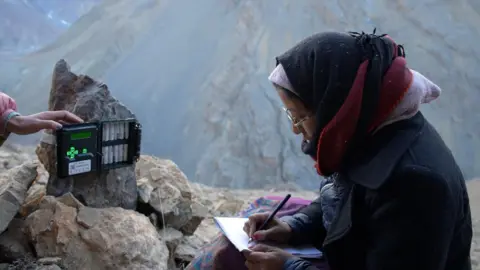
Along with pugmarks, the team looks for other signs, including scrapes and scent‑marking spots, before carefully fixing a camera to a rock along the trail.
One woman then carries out a “walk test”, crawling along the path to check whether the camera’s height and angle will capture a clear image.
The group then moves on to older sites, retrieving memory cards and replacing batteries installed weeks earlier.
By mid-afternoon, they return to camp to log and analyse the images using specialised software – tools many had never encountered before.
“I studied only until grade five,” says Chhering Lanzom. “At first, I was scared to use the computer. But slowly, we learned how to use the keyboard and mouse.”
The women joined the camera-trapping programme in 2023. Initially, conservation was not their motivation. But winters in the Spiti Valley are long and quiet, with little agricultural work to fall back on.
“At first, this work on snow leopards didn’t interest us,” Lobzang says. “We joined because we were curious and we could earn a small income.”
The women earn between 500 ($5.46; £4) and 700 rupees a day.
But beyond the money, the work has helped transform how the community views the animal.

“Earlier, we thought the snow leopard was our enemy,” says Dolma Zangmo, a local resident. “Now we think their conservation is important.”
Alongside survey work, the women help villagers access government insurance schemes for their livestock and promote the use of predator‑proof corrals – stone or mesh enclosures that protect animals at night.
Their efforts come at a time of growing recognition for the region. Spiti Valley has recently been included in the Cold Desert Biosphere Reserve, a Unesco-recognised network aimed at conserving fragile ecosystems while supporting local livelihoods.
As climate change reshapes the fragile trans-Himalayan landscape, conservationists say such community participation will be crucial to safeguarding species like the snow leopard.
“Once communities are involved, conservation becomes more sustainable,” says Deepshikha Sharma, programme manager with NCF’s High Altitudes initiative.
“These women are not just assisting, they are becoming practitioners of wildlife conservation and monitoring,” she adds.
As for the women, their work makes them feel closer to their home, the village and the mountains that raised them, they say.
“We were born here, this is all we know,” Lobzang says. “Sometimes we feel afraid because these snow leopards are after all predatory animals, but this is where we belong.”
[BBC]
Features
Freedom for giants: What Udawalawe really tells about human–elephant conflict
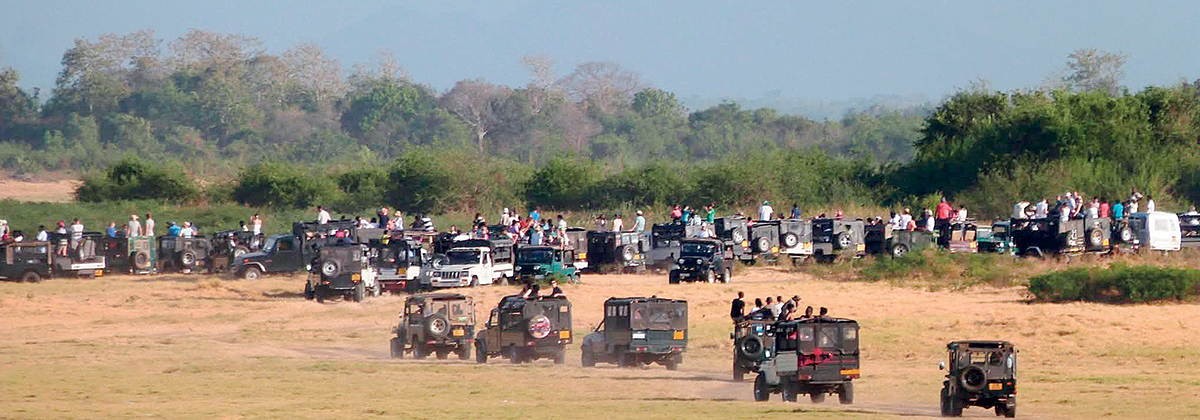
If elephants are truly to be given “freedom” in Udawalawe, the solution is not simply to open gates or redraw park boundaries. The map itself tells the real story — a story of shrinking habitats, broken corridors, and more than a decade of silent but relentless ecological destruction.
“Look at Udawalawe today and compare it with satellite maps from ten years ago,” says Sameera Weerathunga, one of Sri Lanka’s most consistent and vocal elephant conservation activists. “You don’t need complicated science. You can literally see what we have done to them.”
What we commonly describe as the human–elephant conflict (HEC) is, in reality, a land-use conflict driven by development policies that ignore ecological realities. Elephants are not invading villages; villages, farms, highways and megaprojects have steadily invaded elephant landscapes.
Udawalawe: From Landscape to Island
Udawalawe National Park was once part of a vast ecological network connecting the southern dry zone to the central highlands and eastern forests. Elephants moved freely between Udawalawe, Lunugamvehera, Bundala, Gal Oya and even parts of the Walawe river basin, following seasonal water and food availability.
Today, Udawalawe appears on the map as a shrinking green island surrounded by human settlements, monoculture plantations, reservoirs, electric fences and asphalt.
“For elephants, Udawalawe is like a prison surrounded by invisible walls,” Sameera explains. “We expect animals that evolved to roam hundreds of square nationakilometres to survive inside a box created by humans.”
Elephants are ecosystem engineers. They shape forests by dispersing seeds, opening pathways, and regulating vegetation. Their survival depends on movement — not containment. But in Udawalawa, movement is precisely what has been taken away.
Over the past decade, ancient elephant corridors have been blocked or erased by:
Irrigation and agricultural expansion
Tourism resorts and safari infrastructure
New roads, highways and power lines
Human settlements inside former forest reserves
“The destruction didn’t happen overnight,” Sameera says. “It happened project by project, fence by fence, without anyone looking at the cumulative impact.”
The Illusion of Protection
Sri Lanka prides itself on its protected area network. Yet most national parks function as ecological islands rather than connected systems.
“We think declaring land as a ‘national park’ is enough,” Sameera argues. “But protection without connectivity is just slow extinction.”
Udawalawe currently holds far more elephants than it can sustainably support. The result is habitat degradation inside the park, increased competition for resources, and escalating conflict along the boundaries.
“When elephants cannot move naturally, they turn to crops, tanks and villages,” Sameera says. “And then we blame the elephant for being a problem.”
The Other Side of the Map: Wanni and Hambantota
Sameera often points to the irony visible on the very same map. While elephants are squeezed into overcrowded parks in the south, large landscapes remain in the Wanni, parts of Hambantota and the eastern dry zone where elephant density is naturally lower and ecological space still exists.
“We keep talking about Udawalawe as if it’s the only place elephants exist,” he says. “But the real question is why we are not restoring and reconnecting landscapes elsewhere.”
The Hambantota MER (Managed Elephant Reserve), for instance, was originally designed as a landscape-level solution. The idea was not to trap elephants inside fences, but to manage land use so that people and elephants could coexist through zoning, seasonal access, and corridor protection.
“But what happened?” Sameera asks. “Instead of managing land, we managed elephants. We translocated them, fenced them, chased them, tranquilised them. And the conflict only got worse.”
The Failure of Translocation
For decades, Sri Lanka relied heavily on elephant translocation as a conflict management tool. Hundreds of elephants were captured from conflict zones and released into national parks like Udawalawa, Yala and Wilpattu.
The logic was simple: remove the elephant, remove the problem.
The reality was tragic.
“Most translocated elephants try to return home,” Sameera explains. “They walk hundreds of kilometres, crossing highways, railway lines and villages. Many die from exhaustion, accidents or gunshots. Others become even more aggressive.”
Scientific studies now confirm what conservationists warned from the beginning: translocation increases stress, mortality, and conflict. Displaced elephants often lose social structures, familiar landscapes, and access to traditional water sources.
“You cannot solve a spatial problem with a transport solution,” Sameera says bluntly.
In many cases, the same elephant is captured and moved multiple times — a process that only deepens trauma and behavioural change.
Freedom Is Not About Removing Fences
The popular slogan “give elephants freedom” has become emotionally powerful but scientifically misleading. Elephants do not need symbolic freedom; they need functional landscapes.
Real solutions lie in:
Restoring elephant corridors
Preventing development in key migratory routes
Creating buffer zones with elephant-friendly crops
Community-based land-use planning
Landscape-level conservation instead of park-based thinking
“We must stop treating national parks like wildlife prisons and villages like war zones,” Sameera insists. “The real battlefield is land policy.”
Electric fences, for instance, are often promoted as a solution. But fences merely shift conflict from one village to another.
“A fence does not create peace,” Sameera says. “It just moves the problem down the line.”
A Crisis Created by Humans
Sri Lanka loses more than 400 elephants and nearly 100 humans every year due to HEC — one of the highest rates globally.
Yet Sameera refuses to call it a wildlife problem.
“This is a human-created crisis,” he says. “Elephants are only responding to what we’ve done to their world.”
From expressways cutting through forests to solar farms replacing scrublands, development continues without ecological memory or long-term planning.
“We plan five-year political cycles,” Sameera notes. “Elephants plan in centuries.”
The tragedy is not just ecological. It is moral.
“We are destroying a species that is central to our culture, religion, tourism and identity,” Sameera says. “And then we act surprised when they fight back.”
The Question We Avoid Asking
If Udawalawe is overcrowded, if Yala is saturated, if Wilpattu is bursting — then the real question is not where to put elephants.
The real question is: Where have we left space for wildness in Sri Lanka?
Sameera believes the future lies not in more fences or more parks, but in reimagining land itself.
“Conservation cannot survive as an island inside a development ocean,” he says. “Either we redesign Sri Lanka to include elephants, or one day we’ll only see them in logos, statues and children’s books.”
And the map will show nothing but empty green patches — places where giants once walked, and humans chose. roads instead.
By Ifham Nizam
Features
Challenges faced by the media in South Asia in fostering regionalism
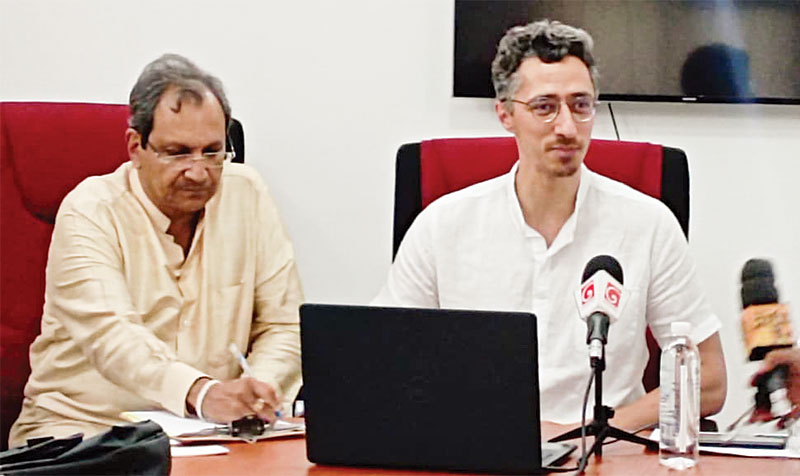
 SAARC or the South Asian Association for Regional Cooperation has been declared ‘dead’ by some sections in South Asia and the idea seems to be catching on. Over the years the evidence seems to have been building that this is so, but a matter that requires thorough probing is whether the media in South Asia, given the vital part it could play in fostering regional amity, has had a role too in bringing about SAARC’s apparent demise.
SAARC or the South Asian Association for Regional Cooperation has been declared ‘dead’ by some sections in South Asia and the idea seems to be catching on. Over the years the evidence seems to have been building that this is so, but a matter that requires thorough probing is whether the media in South Asia, given the vital part it could play in fostering regional amity, has had a role too in bringing about SAARC’s apparent demise.
That South Asian governments have had a hand in the ‘SAARC debacle’ is plain to see. For example, it is beyond doubt that the India-Pakistan rivalry has invariably got in the way, particularly over the past 15 years or thereabouts, of the Indian and Pakistani governments sitting at the negotiating table and in a spirit of reconciliation resolving the vexatious issues growing out of the SAARC exercise. The inaction had a paralyzing effect on the organization.
Unfortunately the rest of South Asian governments too have not seen it to be in the collective interest of the region to explore ways of jump-starting the SAARC process and sustaining it. That is, a lack of statesmanship on the part of the SAARC Eight is clearly in evidence. Narrow national interests have been allowed to hijack and derail the cooperative process that ought to be at the heart of the SAARC initiative.
However, a dimension that has hitherto gone comparatively unaddressed is the largely negative role sections of the media in the SAARC region could play in debilitating regional cooperation and amity. We had some thought-provoking ‘takes’ on this question recently from Roman Gautam, the editor of ‘Himal Southasian’.
Gautam was delivering the third of talks on February 2nd in the RCSS Strategic Dialogue Series under the aegis of the Regional Centre for Strategic Studies, Colombo, at the latter’s conference hall. The forum was ably presided over by RCSS Executive Director and Ambassador (Retd.) Ravinatha Aryasinha who, among other things, ensured lively participation on the part of the attendees at the Q&A which followed the main presentation. The talk was titled, ‘Where does the media stand in connecting (or dividing) Southasia?’.
Gautam singled out those sections of the Indian media that are tamely subservient to Indian governments, including those that are professedly independent, for the glaring lack of, among other things, regionalism or collective amity within South Asia. These sections of the media, it was pointed out, pander easily to the narratives framed by the Indian centre on developments in the region and fall easy prey, as it were, to the nationalist forces that are supportive of the latter. Consequently, divisive forces within the region receive a boost which is hugely detrimental to regional cooperation.
Two cases in point, Gautam pointed out, were the recent political upheavals in Nepal and Bangladesh. In each of these cases stray opinions favorable to India voiced by a few participants in the relevant protests were clung on to by sections of the Indian media covering these trouble spots. In the case of Nepal, to consider one example, a young protester’s single comment to the effect that Nepal too needed a firm leader like Indian Prime Minister Narendra Modi was seized upon by the Indian media and fed to audiences at home in a sensational, exaggerated fashion. No effort was made by the Indian media to canvass more opinions on this matter or to extensively research the issue.
In the case of Bangladesh, widely held rumours that the Hindus in the country were being hunted and killed, pogrom fashion, and that the crisis was all about this was propagated by the relevant sections of the Indian media. This was a clear pandering to religious extremist sentiment in India. Once again, essentially hearsay stories were given prominence with hardly any effort at understanding what the crisis was really all about. There is no doubt that anti-Muslim sentiment in India would have been further fueled.
Gautam was of the view that, in the main, it is fear of victimization of the relevant sections of the media by the Indian centre and anxiety over financial reprisals and like punitive measures by the latter that prompted the media to frame their narratives in these terms. It is important to keep in mind these ‘structures’ within which the Indian media works, we were told. The issue in other words, is a question of the media completely subjugating themselves to the ruling powers.
Basically, the need for financial survival on the part of the Indian media, it was pointed out, prompted it to subscribe to the prejudices and partialities of the Indian centre. A failure to abide by the official line could spell financial ruin for the media.
A principal question that occurred to this columnist was whether the ‘Indian media’ referred to by Gautam referred to the totality of the Indian media or whether he had in mind some divisive, chauvinistic and narrow-based elements within it. If the latter is the case it would not be fair to generalize one’s comments to cover the entirety of the Indian media. Nevertheless, it is a matter for further research.
However, an overall point made by the speaker that as a result of the above referred to negative media practices South Asian regionalism has suffered badly needs to be taken. Certainly, as matters stand currently, there is a very real information gap about South Asian realities among South Asian publics and harmful media practices account considerably for such ignorance which gets in the way of South Asian cooperation and amity.
Moreover, divisive, chauvinistic media are widespread and active in South Asia. Sri Lanka has a fair share of this species of media and the latter are not doing the country any good, leave alone the region. All in all, the democratic spirit has gone well into decline all over the region.
The above is a huge problem that needs to be managed reflectively by democratic rulers and their allied publics in South Asia and the region’s more enlightened media could play a constructive role in taking up this challenge. The latter need to take the initiative to come together and deliberate on the questions at hand. To succeed in such efforts they do not need the backing of governments. What is of paramount importance is the vision and grit to go the extra mile.
-

 Business5 days ago
Business5 days agoSLIM-Kantar People’s Awards 2026 to recognise Sri Lanka’s most trusted brands and personalities
-

 Business19 hours ago
Business19 hours agoZone24x7 enters 2026 with strong momentum, reinforcing its role as an enterprise AI and automation partner
-

 Business7 days ago
Business7 days agoAltair issues over 100+ title deeds post ownership change
-

 Business7 days ago
Business7 days agoSri Lanka opens first country pavilion at London exhibition
-

 Business6 days ago
Business6 days agoAll set for Global Synergy Awards 2026 at Waters Edge
-

 Business5 days ago
Business5 days agoAPI-first card issuing and processing platform for Pan Asia Bank
-
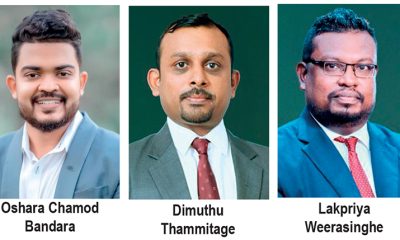
 Business7 days ago
Business7 days agoESOFT UNI Kandy leads the charge in promoting rugby among private universities
-

 Editorial3 days ago
Editorial3 days agoAll’s not well that ends well?















